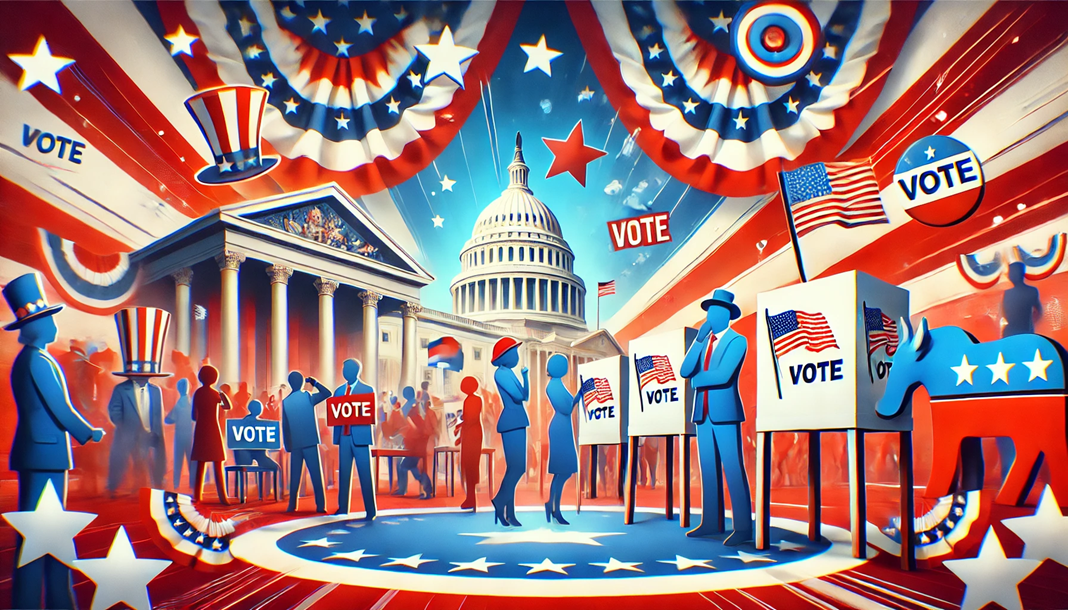‘What’s going to happen next?’
This is a burning question. A relentless question. And we saw it play out in a dramatic way during the buildup to last week’s US presidential election.

Source: Image generated by OpenAI’s DALL-E
So far as I can tell, there were two main issues that the media was wrestling with:
- What were the odds of a candidate securing the White House?
- What were the odds of a political party securing majority control of the House of Representatives or the Senate?
Of course, hindsight is 20/20, isn’t it? But you have to remember — during the run-up to November 5 — there was no true crystal ball. What we had instead was a ‘fog of war’. That state of permanent twilight that creates anxiety because we just don’t know for sure what’s around the corner:
- So, for lack of a better option, media outlets had to rely on opinion polls. How does this work? Well, the pollsters will choose a sample group of people. Then they will gather data by asking these people questions through phone calls and online questionnaires.
- Now, if the pollsters do their jobs well enough, their chosen sample will be representative of the larger population. This will allow the pollsters to organise the data they have gathered, then feed it into forecasting models.
- The final process can be summed up like this: ‘If our data is true, then we predict that this will be the most likely outcome in the future.’
Yes, it sounds simple enough. You simply follow the established procedure. Make sure everything is as scientific as possible. And you should get credible results. Right? Right?
- Well, no. Unfortunately, traditional polling has come under fire in recent years. For example, many polls covering past US presidential elections in 2016 and 2020 have failed to accurately predict key outcomes. Interestingly enough, the same thing appears to have happened again in 2024.
- Why? Well, you might argue that the sampling for the polls was flawed in the first place. Or maybe the forecasting models were poorly constructed. Or — maybe, just maybe — the people who responded to the polls just didn’t give their true opinions, which skewed the results somewhat.
- There’s also another outside possibility. Given the relentless pace of our 24/7 media cycle, I suspect that most polls are already outdated by the time they are published.
- Remember: people have an average attention span of just 8 seconds now. This means that things are more fluid than they ever have been.
So, a growing chorus of critics are now claiming that traditional opinion polls are dead. Instead, they say that the betting markets are a better choice if we want to predict the future:
- How come? Well, quite simply, it’s about responsiveness. Because we’re now living in an attention-deficit world, it might make sense to look at real-time trends as they develop.
- This is why a range of betting platforms have now gained popularity, allowing users to take a punt on various political outcomes. Indeed, this online prediction market runs on the old saying: ‘Put your money where your mouth is.’
- So, is this system actually feasible? Do the gamblers have a better crystal ball than the pollsters? What are the regulatory hazards here? Indeed, this is the billion-dollar question that’s worth exploring…
Your first Quantum Wealth Report is waiting for you:

 Start Your Subscription: NZ$37.00 / monthly
Start Your Subscription: NZ$37.00 / monthly

 Start Your Subscription: US$24.00 / monthly
Start Your Subscription: US$24.00 / monthly

 Login
Login Managed Accounts
Managed Accounts Quantum Wealth
Quantum Wealth





John is the Chief Investment Officer at Wealth Morning. His responsibilities include trading, client service, and compliance. He is an experienced investor and portfolio manager, trading both on his own account and assisting with high net-worth clients. In addition to contributing financial and geopolitical articles to this site, John is a bestselling author in his own right. His international thrillers have appeared on the USA Today and Amazon bestseller lists.